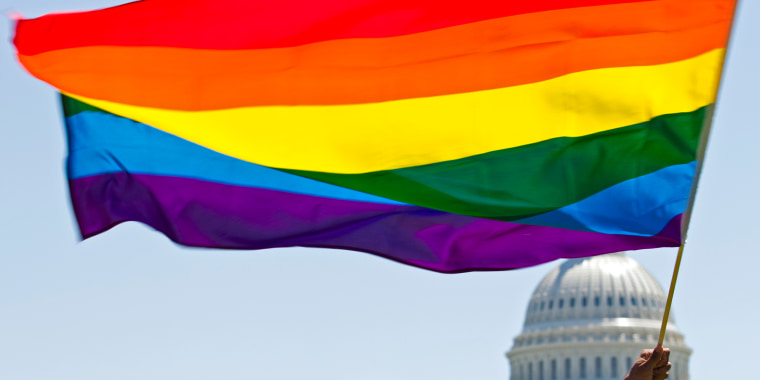UPDATE (Dec. 8, 2022, 4:15 p.m. E.T.): On Thursday the House passed the Respect for Marriage Act, which enshrines federal protections for marriages of same-sex and interracial couples, in a 258-169 vote.
The Respect for Marriage Act, which purportedly would enshrine the rights of same-sex couples to form legal unions, cleared another major procedural hurdle Monday when its supporters in the U.S. Senate got more than the 60 votes needed to limit debate. The Senate is expected to approve the bill as soon as this week, members of the House are expected to approve changes made since they signed off on an earlier version in July, and then President Joe Biden is expected to sign it into law.
The Respect for Marriage Act, which purportedly would enshrine the rights of same-sex couples to form legal unions, just passed another major procedural hurdle.
It is ostensibly a good idea. A same-sex marriage bill sounds great, right? At least it does to the 70% of Americans who support same-sex marriage. But as a queer person, I cannot support the bill senators advanced Monday. When one looks a little closer at the legislation, it becomes apparent how the bill panders to religious groups and denies protections to LGBTQ Americans who need them most. Sponsors of the bill put up minimal resistance as they made a number of concessions to conservative lawmakers to win bipartisan support.
The bill is a response to the Supreme Court’s hard ideological shift to the right. The conservative majority of the court overturned Roe v. Wade in June, and Justice Clarence Thomas, in an opinion concurring with the majority, wrote that for consistency’s sake, “In future cases, we should reconsider all of this Court’s substantive due process precedents, including Griswold, Lawrence, and Obergefell.” Griswold, Lawrence and Obergefell — at least until the court overturns them — guarantee the right to use contraception, be in a same-sex relationship and marry a same-sex partner.
With the signal that the right to same-sex marriage could be invalidated by the Supreme Court, Congress came up with the Respect for Marriage Act, which, once it becomes law, would repeal the 1996 Defense of Marriage Act, signed into law by President Bill Clinton. According to that law “the word ‘marriage’ means only a legal union between one man and one woman as husband and wife” — that is, one cisgender man and one cisgender woman.
The proof that sponsors of the new legislation gave up too much is evident in the support for the bill from the Church of Jesus Christ of Latter-Day Saints, widely known as the Mormon Church. Historically, the church has fervently opposed same-sex marriage. It was a vocal proponent of the contentious 2008 California referendum, Proposition 8, which successfully (although briefly) defined marriage as that between a cisgender man and a cisgender woman. To a casual observer, it might appear that the Latter-Day Saints simply caught up with the times. While some of them may well have, it is important to note that this same-sex marriage bill also comes with some protections for their church.
The concession was made in the form of an amendment that not only spells out that religious organizations can refuse to marry same-sex couples but also protects such religious organizations’ tax-exempt status and ensures they still receive other federal benefits should they choose to discriminate against same-sex couples who wish to wed.
As quoted by NPR, Sen. Thom Tillis, R-N.C., a co-sponsor of the Respect for Marriage Act, said, “As we went through this bill, we listened to the very sincere concerns of Americans with strongly held religious beliefs who simply wanted to make sure that Congress protects their First Amendment rights.”
Latter-Day Saints have done a wonderful job of branding by characterizing their church’s support of the bill as a sign of unity, rather than what it is: a longstanding homophobic institution perversely seizing the opportunity to enshrine its own right to discriminate.
“We believe this approach is the way forward,” the church said in a Nov. 15 statement. “As we work together to preserve the principles and practices of religious freedom together with the rights of LGBTQ individuals, much can be accomplished to heal relationships and foster greater understanding.”
Call me old-fashioned, but I find it hard to understand how enshrining the church’s right to discriminate against LGBTQ people would give way to healing and greater understanding.
It is about as convincing as a GOP elephant draped in a rainbow flag.
Even worse than the appeasement to religious conservatives is the bill’s failure to require states to issue same-sex marriage licenses. The Respect for Marriage Act merely requires the states to recognize a same-sex marriage license. So, if the Supreme Court overturns its Obergerfell ruling, states would still be permitted to ban same-sex marriage, and, incidentally, the vast majority of states do: 35 states, to be exact. Those are also the states where LGBTQ individuals are most vulnerable and, thus, are in even more need of enshrined and codified civil protections.
This so-called Respect for Marriage Act protects the laws of the 15 states that permit same-sex marriage and, by and large, tend to be less hostile toward LGBTQ people. But it also protects the laws of those 35 states that restrict LGBTQ people’s rights.
In the same way that pro-choice advocates have launched campaigns to protect people’s reproductive rights by ensuring they are enshrined in the state constitutions, the same approach should be adopted in regard to same-sex marriage. This bill does not come close. It gives both churches and states permission to discriminate. Yet it is being described as a win for the LGBTQ community. It is about as convincing as a GOP elephant draped in a rainbow flag.
